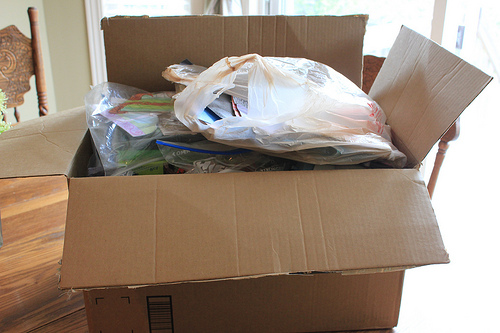
Choosing the wrong type of moving company could inadvertently lead you into a scam. That is why, on our blog, we often reiterate that you should always do your homework long before you settle on a moving company to handle your relocation project.
According to the American Moving and Storage Association, complaints about moving scams have increased by 25% in the last five years. The following tips and advice can help you reduce the stress of moving your household to another city or state. The foremost step is to select a legitimate professional moving company with verifiable credentials. The movers should come into your home and see how much there will be to move, and they need to visually inspect your household items to make an estimate.
Rogue scammers are popping up everywhere, even in the moving company business and they are luring those of you who want to be able to move at a cheaper price. Many of these companies are inexperienced newcomers; finding one licensed, certified, and a member of the American Moving and Storage Association is a rare stroke of luck.
Understanding the common signs of a moving company scam is crucial for anyone planning a move. Let’s now move on to an important aspect of your moving journey: identifying and avoiding scams. This essential guide will empower you with the necessary knowledge to identify potential frauds and confidently make decisions that keep your move safe.
Be Cautious of Suspiciously Low Quotes
Scam movers are devising many ways in which to scam you out of your money when you move, and one of the more popular ways is by inflating the estimated prices and quotations. One should beware of those moving representatives who come over to your home to give you an estimate and a low quote, which mysteriously gets higher when moving day arrives. The best way you can counteract this is by double-checking the representative’s estimate sheet to make sure that he has not left out anything.
Research shows that scam-moving companies often quote prices 20–30% lower than legitimate companies. This is a tactic to attract customers before inflating costs later. Most consumers have had experiences with moving representatives who have deliberately left out a room or two on their estimates, only to add them to the cost of moving day. On the other hand, some moving companies love to give you estimates over the phone without seeing your household items.
These moving companies work blindly as they get you to be their eyes at your home to evaluate what you have. This is another bad way to do business since what is quoted on the phone can suddenly become higher on moving days. Ensure that the movers send their representatives out to your home to estimate the items before you move.
On average, individuals who fall victim to moving scams lose about $1,500. Moving companies that do not write up an estimate are not legitimate, since this is a necessary first step in the moving process. Second, the movers should not require any down payment or deposit of any kind. This is the mark of a scammer—asking or pressuring the customer into believing that a down payment is part of the move. It is not. How are you to know that they will deliver your boxes and furniture once they have your money?
First Red Flags
One of the first signs of a scam moving company is its fees. A rogue mover may quote you a price and then add another unexpected fee later on in your moving project. To avoid this, you should ensure that the quoted fees are in writing.
Be Cautious Of the Cheapest Price
Consider comparing that price to a few others on the market before selecting the one that is the lowest and moving on. Not that you should avoid cheap movers, but you should exercise extra caution if one quote is significantly less than all the others in your area.
Do Your Research
Is the company you are dealing with an illegitimate moving company? You can easily find out by doing some research with the mover’s association. Another way you can verify a mover is by asking for a face-to-face meeting. At this meeting, you would be able to see if the movers are operating from a physical office as well as get a glimpse of the people who work with the moving company. You will also get the opportunity to see the moving vans available and to view the certifications and licenses displayed on the wall or desk.
Not all new movers are dubious. But there are a lot of businesses that come and go in the moving industry, particularly during the summer. As a selling point, most businesses will want to highlight or advertise their years of experience.
Upfront Payment
Do not pay or sign for such services if a mover informs you that a substantial deposit or cash deposit is required. These people can take the deposit and flee, failing to appear on the day of your move. Instead, work with a business that doesn’t ask you to make a sizable financial deposit to secure their services.
To make sure the movers will show up at your house on the move day and on schedule, make sure to check with the moving company at least once after booking the truck and the services. The majority of trustworthy businesses will only demand a down payment of 20% or less of the total cost.
One more red flag that can help you avoid being scammed by a moving company is if they advertise much lower rates than every other company that you have checked into. They may try to lure customers with attractive pricing, but a legitimate mover will always offer an estimate based on actual market values for their services since there is a lot of competition among movers.
Cash Only
Cash transactions lack the traceability of digital payments, which can be a goldmine for shady operators in the moving industry. When a moving company insists on cash only, they might not just be dodging a paper trail; they could be planning to vanish with your belongings or your money.
• Cash encourages anonymity: When movers insist on cash, they often sidestep the formal trails that credit card or check payments leave. This anonymity can be a boon for those looking to avoid taxes or operate under the radar of regulatory bodies.
• No chargebacks or disputes: Unlike credit cards, cash doesn’t offer the safety net of disputes or chargebacks. This means that once your money is handed over, reclaiming it in case of a dispute or poor service becomes a complex, if not impossible, task.
Upselling Moving Supplies
There are also some moving companies that would further reinforce your boxes and possessions with their own packaging, which you may assume is a free job since you never asked for it. But do not be surprised if the few extra boxes and tape that you have received from your moving representative come up on your moving invoice. You would be better off if you kept extra boxes and packaging around, even tape to avoid this situation.
Holding Your Items Hostage
Moving companies occasionally hold your belongings hostage until you pay them an increased sum of money. Federal law prohibits movers from charging more than 110% of the original estimate before delivery. For effective moving company fraud prevention, always request a written estimate and a binding quote to avoid unexpected charges.
There are thousands of people who have fallen victim to this scam—they give the moving company money before the move and either never see that company, or their things, again, or the scammers show up at the new house asking for more money than the original amount that was quoted to the customer.
They hold the customer’s furniture hostage until their demands are met, which is illegal but happens all the time. You can prevent this by making sure you know the moving company’s reputation, physical address, website, and telephone numbers.
Operating Under Different Names
To avoid a bad online reputation, some crafty moving businesses change the name of their service. The average lifespan of a scam moving company is under two years, often rebranding to avoid detection. Make sure the moving company you select to work with is authorized to operate and insured.
When you call, they ought to respond to your call with the entire name of the business, and if you ask, they ought to be able to give you a few referrals. You can get in touch with these referrals and find out how they found the moving company.
They must also have the right certificates and licenses. Ask for their DOT and MC license numbers. It is also helpful to research the company to see if there are any published complaints about them by previous customers and, if so, what type of problems they encountered. Check with the Better Business Bureau as well. From local movers to car moving companies, you must always look into their business before choosing them.
Moving Brokers
Also, more and more moving brokers are posing as moving companies, and they are pulling the old “bait and switch” on unsuspecting consumers. You may call a moving company and make arrangements for that company’s movers to come out to relocate you on a moving day. By the time moving day arrives, you realize that your moving job has been passed on to another group of movers. Ensure that the company that you choose is not a moving broker, and ask them to meet the movers that they will be sending out to your home on a moving day.
If you find a mover and do not have much information about them, you can always check them out by searching the Federal Motor Carriers Safety Administration, (FTCSA), at www.fmcsa.dot.gov.
Digital Footprint Analysis of Moving Companies
When you’re planning a move, a moving company’s online presence can be a goldmine of valuable information that helps you avoid potential scams. Let’s explore effective ways to analyze a moving company’s digital footprint.
To begin, closely examine the moving company’s website. A reputable company’s website should provide comprehensive information about its services, clearly list contact details, and include an “About Us” page that offers insights into the company’s history and its team. Look for a physical address and phone number; these are strong indications of a legitimate business.
Equally important, the website should prominently display their license information, memberships, and affiliations with government bodies. These elements are crucial indicators of a genuine and compliant business. Be cautious when encountering websites that lack these fundamental details or contain numerous grammatical errors and broken links.
Next, turn your attention to online reviews. Sites like Yelp, Google Reviews, and Better Business Bureau are goldmines for customer feedback. However, approach these reviews with a critical eye. Look for patterns in the reviews. Are there numerous complaints about hidden fees or poor communication? Remember, a few negative reviews among many positive ones can be normal, but a pattern of similar complaints is a red flag. Also, be cautious of companies with only glowing reviews, as these can sometimes be fabricated.
Examine the company’s social media presence. A genuine moving company often maintains active social media profiles to connect with customers. Look at their posts, customer interactions, and the frequency of updates. Authentic companies tend to share helpful moving tips, and customer testimonials, and engage with their audience regularly. Be cautious if you find a social media page with minimal activity or one that doesn’t align with the company’s overall image and values.
International Moving Scams and Key Red Flags to Be Aware Of
When planning an international move, the complexity increases, and so does the potential for encountering scams. Unlike local or national moves, international relocations involve more intricate processes, including customs regulations and international licensing, which can be exploited by unscrupulous movers. Here’s what you need to be vigilant about:
Be aware of the customs regulations, which vary significantly from country to country. Scammers may promise a smooth customs clearance process but can leave you entangled in legal issues or unexpected fees. A legitimate international moving company should provide clear guidance on customs protocols and have a track record of managing such processes efficiently. Familiarize yourself with interstate moving company regulations, including the requirement for movers to provide a written estimate and a detailed inventory list for cross-state relocations. They should be upfront about all the potential costs and legal requirements involved in moving your belongings across borders.
Another red flag is the lack of proper international licensing. Reliable international movers are required to have specific licenses for operating across borders. Verify their credentials—ask for their license numbers and check them against international transport regulatory bodies. A lack of transparency in this area is a strong indicator that you might be dealing with a fraudulent company.
Understanding the Risks and Red Flags

One common tactic used by scammers is offering significantly lower rates for international moves. While it’s tempting to save money, these too-good-to-be-true offers often lead to compromised services, hidden fees, or worse, your belongings never reaching their destination. Always get multiple quotes and compare them; if one is drastically lower than the others, it’s a cause for concern.
Safe Practices to Follow When Hiring a Moving Company
The first step in your moving adventure is to gather multiple estimates. This isn’t just about comparing prices; it’s about gauging the professionalism and reliability of different companies. When you receive these estimates, observe the thoroughness with which the assessment is conducted. A detailed walkthrough of your home, noting each item, reflects a company’s commitment to accuracy and transparency. This approach also provides you with a clearer picture of the moving process, helping you to anticipate and plan for the actual moving day.
Reading contracts thoroughly is more than a precaution; it’s your primary defense against potential fraud. A legitimate moving company will present a clear, detailed contract that outlines every aspect of their service. This includes itemized costs, delivery timelines, and insurance coverage. Be aware of your consumer rights in moving services, which include receiving a ‘Rights and Responsibilities’ booklet from interstate movers, as mandated by federal law. Pay special attention to any clauses about additional fees or services. If something isn’t clear, don’t hesitate to ask for clarification. Remember, a reputable company will always be willing to explain and ensure your understanding and comfort with the terms.
By following these practices, you empower yourself to make decisions that protect your interests and ensure a smooth transition to your new home. And remember, if you’re in need of local movers or moving labor assistance, visit MoversCorp to compare and hire a company. This resource can be a valuable tool in your journey, offering a range of options and insights to help you make the best choice for your move.
Ask the Right Questions
In order to protect yourself from such scams, you have to ask the important questions. You may considerably lower your chances of falling victim to fraudulent methods by being diligent and aggressive in your inquiry. Asking the right questions not only assists you in gathering critical information but also shows your vigilance and sets the tone for a dependable and trustworthy moving experience.
Prioritize two critical factors: licensing and reputation. First and foremost, find out if the moving business is licensed and insured, as this ensures compliance with local and state rules while also protecting your property. Request proof of their licensing and get it validated with the appropriate authorities. Furthermore, don’t underestimate the importance of the company’s reputation. To evaluate their experiences, request references from former clients or check consumer reviews. Indicators of punctuality, professionalism, and overall client satisfaction should be sought.
Get a Copy of the Contract
This is probably not the price you will wind up paying if you are making a verbal agreement over the phone without having any written or legally binding documents that have been signed. You will be at this company’s mercy to pay what is essentially a ransom for your belongings to be restored because they will have all of your possessions. Legitimate businesses will give you legal forms.
Background Check
This is the type of information you would not yield from a phone interview. Most of the time, rogue movers use prepaid cell phones which makes it easier for them to conveniently go out of business when the first sign of trouble arises.
Another precautionary method is to research the Internet to do a background check and moving reviews on prospective moving companies. The Better Business Bureau is a good place to start when doing your online research.
Reporting Moving Fraud
Making a formal complaint to the moving company is the initial step. Reputable movers will discuss your concerns and reach a compromise. Contact their regional office and corporate headquarters to see if they can help. If it turns out that you are working with a dishonest moving business, you can contact a number of government agencies and lodge a formal complaint.
Interstate moves are twice as likely to result in scam incidents compared to local moves. The US Department of Transportation’s (USDOT) Federal Motor Carrier Safety Administration (FMCSA) is in charge of overseeing several elements of the moving, storage, and trucking industries. This office frequently deals with interstate moving frauds.
Legal Recourse for Victims of Moving Scams
If you ever find yourself ensnared in a moving scam, it’s essential to recognize that you possess legal avenues for seeking justice and compensation. The initial step involves reaching out to local law enforcement. Reporting the scam to the police not only establishes an official record of the incident but also kickstarts an investigation that has the potential to shield others from falling victim to the same deceptive ploy.
Following that, it’s imperative to seek legal counsel. Engaging a lawyer who specializes in consumer protection or fraud can be your guiding light through the intricacies of your case. They will assist you in comprehending your rights and the specific laws violated by the moving company. This legal expertise is invaluable when navigating the often perplexing realm of consumer rights and fraud legislation.
You might have the opportunity to take legal action against the moving company due to contract breaches, fraudulent activities, or other legal infractions. This avenue could potentially result in you receiving compensation for any financial hardships you’ve faced, and in certain instances, punitive damages may apply. It’s essential to remember that pursuing civil action serves a dual purpose: not only seeking compensation but also ensuring that these deceitful movers are held accountable and serving as a deterrent against future scams.
Beyond pursuing individual legal action, you might want to explore the option of joining a class-action lawsuit, especially if there are multiple victims who have faced similar issues. This collective approach can have a more significant impact, potentially leading to broader changes in industry practices or regulations.
The Role of Insurance in Protecting Against Moving Scams
When you’re planning a move, understanding the role of insurance in protecting your possessions can be a game-changer, especially in the context of moving scams. Let’s unravel the layers of protection that different types of insurance offer, providing a safety net in these scenarios.
1. Basic Liability Coverage: Often, moving companies provide basic liability insurance at no extra cost. This coverage, however, offers minimal protection – typically at a rate per pound per item. While this might sound reassuring, in the event of a scam or mishandling, the compensation you receive might be significantly less than the actual value of your items. It’s like having a safety net with too many holes—it’s there, but can you really rely on it for complete protection?
2. Full Value Protection: Here’s where things get more interesting. Full-Value Protection, although more expensive, can be your knight in shining armor. This insurance ensures that if your items are lost, damaged, or fall victim to a scam, you’re entitled to the full replacement value. The moving company either has to repair the item, replace it with a similar one, or provide a cash settlement. It’s like having a robust shield safeguarding your treasures.
3. Third-Party Insurance: Sometimes, the cover provided by moving companies doesn’t quite cut it. That’s where third-party insurance comes into play. These policies offer more comprehensive coverage and can be tailored to your specific needs. Think of it as an extra layer of armor, custom-fitted for your unique moving scenario. Whether it’s antiques, electronics, or sentimental items, third-party insurance can provide the specific protection you need.
Interactive Checklist: Are You Prepared to Avoid Moving Company Scams?
1. Research and Verification:
- Have you checked the moving company’s license and insurance?
- Did you verify their physical address and contact information?
- Have you looked up their DOT and MC license numbers?
2. Online Presence and Reviews:
- Have you examined the moving company’s website for professionalism and transparency?
- Did you read online reviews on multiple platforms like Yelp, Google Reviews, and the Better Business Bureau?
- Have you analyzed their social media profiles for customer engagement and authenticity?
3. Estimates and Contracts:
- Did you receive a detailed, in-home estimate from the moving company?
- Have you compared estimates from multiple moving companies?
- Are you aware of the differences between binding and non-binding estimates?
- Have you read and understood all the terms in the moving contract?
4. Payment and Fees:
- Are you aware that legitimate movers typically do not require large deposits?
- Do you know the federal law regarding not charging more than 110% of the original estimate before delivery?
- Are you prepared to avoid movers who demand cash or large deposits upfront?
5. Awareness of Scam Tactics:
- Can you identify red flags like significantly lower rates than market value?
- Are you aware of the risks of last-minute moving scams and inflated fees?
- Do you know how to spot if a moving company is operating under different names to avoid a bad reputation?
6. Legal Knowledge and Rights:
- Are you familiar with your rights and responsibilities when hiring a moving company?
- Do you know the legal recourse available if you fall victim to a moving scam?
- Are you aware of the role of insurance in protecting your belongings during a move?
7. Personal Preparedness:
- Have you prepared a list of questions to ask the moving company?
- Are you ready to report any fraudulent activities to the appropriate authorities?
- Do you have a plan for safekeeping important documents and valuables during the move?
Things You Didn’t Know
The Intricacies of Moving Company Contracts: Did you know that some moving companies use non-binding estimates to lure customers into a false sense of security? These estimates can be significantly lower than the actual cost, and the final bill often shocks customers. Unlike a binding estimate, which guarantees the cost of the move based on the goods estimated, non-binding estimates can change, allowing unscrupulous movers to inflate the price on a moving day.
The Role of Federal Regulations in Interstate Moves: It’s less known that while local moving companies are regulated by state laws, interstate movers are governed by federal regulations. This distinction is crucial because it affects the recourse available to you in case of a dispute. For interstate moves, the Federal Motor Carrier Safety Administration (FMCSA) provides specific guidelines and a platform for complaints, which many customers are unaware of.
The Hidden Costs of Moving Insurance: Many people don’t realize that the free insurance provided by moving companies, often referred to as Released Value Protection, only covers a fraction of the value of your belongings – typically around 60 cents per pound per item. This means if a 10-pound stereo system worth $1000 is damaged, you would only receive $6 in compensation. Understanding the limitations of this basic coverage is essential for protecting your valuables.
The Reality of Last-Minute Moving Scams: A less discussed but prevalent scam involves last-minute moves. Some movers take advantage of customers who need to move urgently, charging exorbitant fees or demanding higher payments before unloading. This tactic preys on the customer’s vulnerability due to the time-sensitive nature of their move.
The Misuse of Storage Fees and Accessorial Charges: In some cases, moving companies may hold your belongings in storage, claiming unforeseen circumstances, and then charge additional storage fees. Additionally, accessorial charges for services like long carry or shuttle service can be inflated without proper justification, significantly increasing the overall cost of the move.
The Deception of Moving Company Reviews: While online reviews can be helpful, some moving companies manipulate these platforms by creating fake reviews. This practice makes it challenging to discern the legitimacy and quality of their services. It’s important to cross-reference reviews across multiple platforms and be wary of a company with exclusively five-star ratings.
Navigating the complexities of hiring a moving company requires vigilance and informed decision-making. Understanding the nuances of moving contracts, federal regulations, insurance limitations, and the potential for last-minute scams and inflated charges is crucial. By being aware of these lesser-known aspects and conducting thorough research, you can protect yourself from falling victim to moving scams.




Moving scam is a place that will give you all the information that you will ever need when it comes to moving scams. This place know what they are talking about. If you are worried about moving or you feel like the movers you are using are not legit, then go to the website and learn more.
Awareness is the only thing that can prevent these scams from happening. Good information for those who are moving. 🙂
When looking for a mover, make sure they are licensed with the Department of Transportation for your state. On our site, we have to have a link to TxDot required by TxDot. Also, try to get a guarantee not to exceed the price; this way you have a cap on what you spend, and if your weight or items are less, you pay a lesser amount. Stay away from most Craigslist companies is a huge tip as well. They have great rates but once they have your items on their truck you pretty much lose all of your power. This is sad, but true.
Trying to cut costs in this day and age is pretty much mandatory, and sometimes the deal sounds so good that you might forget to ask the right questions. It is very important to have several conversations with your mover before you ever sign a document or even think about giving them a dime. If the mover is willing to do the move without a deposit it can be a good sign, but mostly you need to trust the company you are working with. If it sounds too good to be true it probably is, one of the best ways to save money is to plan and pack properly, any work you can cut out of the moving job will save you valuable time in the end.